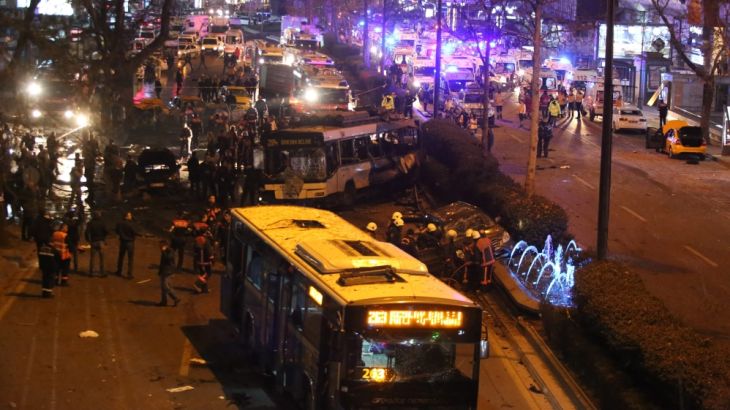Car bomb hits Turkey’s Ankara for second time in weeks
Explosion near transport hub kills 37 and wounds scores more in the third deadly attack in Ankara since October.

At least 37 people were killed and more than 70 hospitalised with wounds after a car bomb struck the Turkish capital. It was the second mass-casualty blast to rock Ankara in three weeks.
Witnesses said the blast on Sunday set vehicles on fire and heavily damaged several buses.
Keep reading
list of 4 itemsHong Kong’s first monkey virus case – what do we know about the B virus?
Why will low birthrate in Europe trigger ‘Staggering social change’?
The Max Planck Society must end its unconditional support for Israel
|
|
The explosion, which could be heard several kilometres away, also sent burning debris showering down over an area a few hundred metres from the justice and interior ministries, a top courthouse, and the former office of the prime minister.
“These attacks, which threaten our country’s integrity and our nation’s unity and solidarity, do not weaken our resolve in fighting terrorism but bolster our determination,” President Recep Tayyip Erdogan said in a statement.
“As of now there has been no claim of responsibility,” said Al Jazeera’s Mohammed Jamjoom, reporting from Istanbul.
“But this is a real concern for Turkey. It happened in the capital and this is the third explosion to have happened” in Ankara since October.
READ MORE: Ankara bombing and the failing Turkish state
Meanwhile, Turkey’s air force hit Kurdish rebel targets in northern Iraq on Monday.
Nine F-16s and two F-4 jets raided 18 positions of the outlawed Kurdistan Workers’ Party, or PKK, including the Qandil mountains where the group’s leadership is based, the state-run Anadolu news agency reported. Targets hit consisted of ammunition depots, bunkers and shelters.
Police carried out raids in the southern city of Adana, detaining suspected PKK rebels, the agency reported. The private Dogan news agency said at least 36 suspects were taken under custody. Fifteen suspected Kurdish fighters were also detained in Istanbul, Anadolu said.
Local broadcasters reported that an Ankara court ordered a ban on access to Facebook, Twitter and other sites in Turkey, after images from the car bombing were shared on social media. Several local users reported difficulty in accessing the sites.
Fadi Hakura, a Turkey expert and associate fellow at Chatham House, told Al Jazeera that insecurity was becoming the new norm in the country.
“Insecurity and instability now is the new dynamic in Turkish politics and in society,” he said.
“Both of the last two attacks happened before the summit between the EU and Turkey, so I suspect that the group that carried out these attacks was seeking maximum publicity, not just in Turkey but in the outside world, to make it clear that Turkey is an insecure and unstable place.”
READ MORE: Mayor of Turkey’s Kilis backs Nobel Prize bid
Sunday’s attack comes just three weeks after a suicide car bombing in Ankara targeted buses carrying military personnel, killing 29 people.
“We know how and when we will respond,” Ahmet Davutoglu, Turkey’s prime minister, told Al Jazeera in an interview, referring to the February attack.
“Definitely, those who made this attack against our people will pay the price, but how and when, we will decide. And when it happens, everybody will see that Turkey can respond [to] any challenges, any attack, against it.”
A Kurdish armed group, the Kurdistan Freedom Hawks (TAK), which is an offshoot of the outlawed PKK, claimed responsibility for that attack. TAK says it split from the PKK.
![There has not been any claim of responsibility for the Ankara bombing as of Monday [Reuters]](/wp-content/uploads/2016/03/249a90f4d4d64f2ea7c8b9ecc393a78a_18.jpeg)
Turkey has been fighting on multiple fronts. As part of a US-led coalition, it is battling the Islamic State of Iraq and the Levant (ISIL, also known as ISIS), which has seized territory in neighbouring Syria and Iraq.
It is also battling the PKK in its southeast, where a two-and-a-half-year ceasefire collapsed last July, prompting the worst violence since the 1990s.
Turkey sees the unrest in its largely Kurdish southeast as deeply linked to events in northern Syria, where the Kurdish YPG militia has seized territory as it fights both ISIL and rebels battling President Bashar al-Assad.
READ MORE: Turkish PM – those who attack ‘will pay the price’
Turkey fears those gains will stir separatist ambitions among its own Kurds and has long argued that the YPG and PKK have close ideological and operational ties.
In its armed campaign in Turkey, the PKK has historically struck directly at the security forces and says it does not target civilians.
ISIL has carried out at least four bomb attacks on Turkey since June 2015, including a suicide bombing which killed 10 German tourists in central Istanbul in January.
